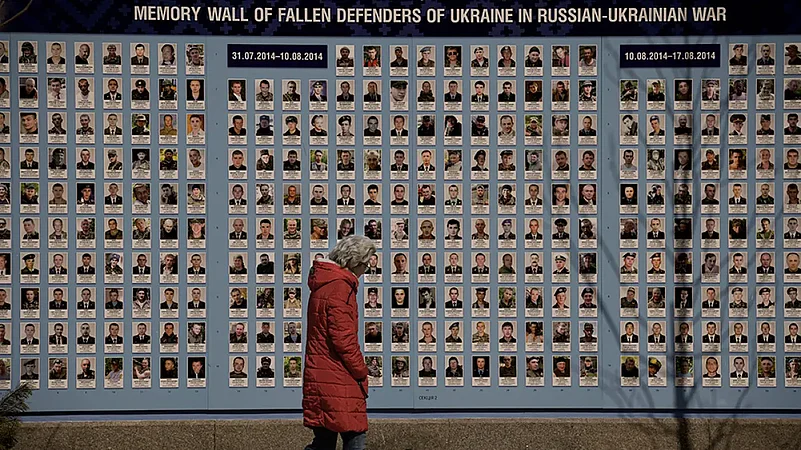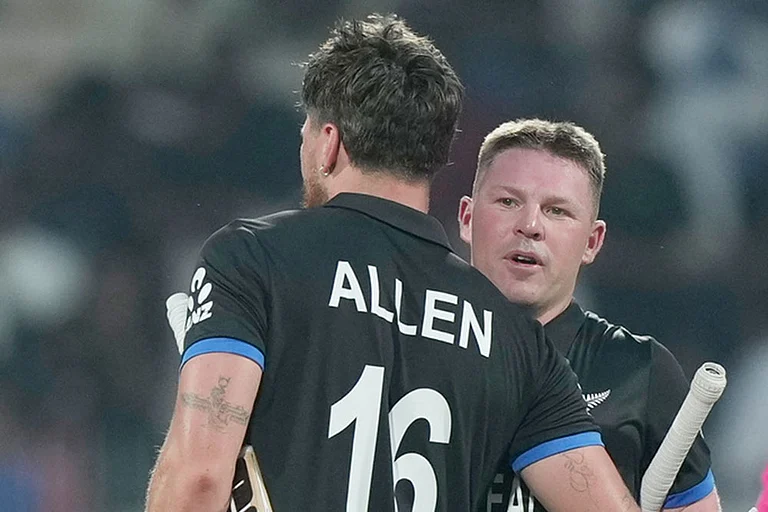Ukrainian President Volodymyr Zelenskyy said Russian forces are blockading his country's largest cities to wear the population down into submission, but he warned Saturday that the strategy will fail and Moscow will lose in the long run if it doesn't end its war.
Zelenskyy accused the Kremlin of deliberately creating “a humanitarian catastrophe ” and appealed for Russian President Vladimir Putin to meet with him, using a huge Moscow stadium rally where Putin lavished praise on Russian forces Friday to illustrate what was at stake.
“Just picture for yourself that in that stadium in Moscow there are 14,000 dead bodies and tens of thousands more injured and maimed. Those are the Russian costs throughout the invasion,” Zelenskyy said in a nightly video address to the nation recorded outside the presidential office in Kyiv.
The rally and a concert in Moscow were held to commemorate the anniversary of Russia's annexation of Crimea, which it seized from Ukraine on 2014. The event included patriotic songs such as “Made in the U.S.S.R.,” with the opening lines “Ukraine and Crimea, Belarus and Moldova, it's all my country.”
“We have not had unity like this for a long time,” Putin told the cheering crowd.
The rally took place as Russia has faced heavier-than-expected losses on the battlefield and increasingly authoritarian rule at home. The event was surrounded by suspicions it was a Kremlin-manufactured display of patriotism. Russian police have detained thousands of people from protests of Russia's invasion of Ukraine.
Fighting continued on multiple fronts in Ukraine. In the besieged port city of Mariupol, the site of some of the war's greatest suffering, Ukrainian and Russian forces battled over the Azovstal steel plant, one of the biggest in Europe, Vadym Denysenko, adviser to Ukraine's interior minister, said Saturday.
“I can say that we have lost this economic giant," Denysenko said in televised remarks. "In fact, one of the largest metallurgical plants in Europe is actually being destroyed.”
The Russian military reported Saturday that it has used its latest hypersonic missile for the first time in combat. A spokesman for the Russian Defense Ministry, Maj. Gen. Igor Konashenkov, said Kinzhal missiles destroyed an underground warehouse storing Ukrainian missiles and aviation ammunition in the western Ivano-Frankivsk region of Ukraine.
Konashenkov said Russian forces also used the anti-ship Bastion missile system to strike Ukrainian military facilities near the Black Sea port of Odesa. Russia first used the weapon during its military campaign in Syria in 2016.
Ukrainian and Russian officials agreed to establish 10 humanitarian corridors for bringing aid in and residents out - one from the besieged port city of Mariupol, several in the Kyiv region and several in the Luhansk region, Ukrainian Deputy Prime Minister Iryna Vereshchuk said Saturday.
She also announced plans to deliver humanitarian aid to the city of Kherson, which is currently under control of the Russian forces.
In his nightly video address, Zelenskyy said Russian forces are blockading the largest cities with the goal of creating such miserable conditions that Ukrainians will cooperate. He said the Russians are preventing supplies from reaching surrounded cities in central and southeastern Ukraine.
He said the rally held Friday in Moscow to celebrate Russia's 2014 annexation of Crimea Peninsula from Ukraine had brought out around 200,000 people, or the same number of Russian military personnel involved in the current invasion of Ukraine.
“The time has come to restore territorial integrity and justice for Ukraine. Otherwise, Russia's costs will be so high that you will not be able to rise again for several generations,” Zelenskyy said.
Putin's appearance at Friday's rally marked a change from his relative isolation of recent weeks, when he has been shown meeting with world leaders and his staff either at extraordinarily long tables or via videoconference.
Seeking to portray the war as just, Putin paraphrased the Bible to say of Russia's troops: "There is no greater love than giving up one's soul for one's friends.”
Taking to the stage where a sign read “For a world without Nazism,” he railed against his foes in Ukraine with a baseless claim that they are “neo-Nazis” and insisted his actions were necessary to prevent “genocide" - an idea flatly rejected by leaders around the globe.
Putin's quoting of the Bible and an 18th-century Russian admiral reflected his increasing focus in recent years on history and religion as binding forces in Russia's post-Soviet society. His branding of his enemies as Nazis evoked what many Russians consider their country's finest hour, the defense of the motherland from Germany during World War II.
In the wake of the invasion, the Kremlin has clamped down harder on dissent and the flow of information, arresting thousands of antiwar protesters, banning sites such as Facebook and Twitter, and instituting tough prison sentences for what is deemed to be false reporting on the war, which Moscow refers to as a “special military operation.”
High above the conflict, three Russian cosmonauts arrived Friday at the International Space Station wearing bright yellow flight suits with blue accents matching the colors of the Ukrainian flag.
Since the war started, many people have used the Ukrainian flag and its colors to show solidarity with the country.
But cosmonaut Oleg Artemyev said every crew chooses its own suits, and they had a lot of yellow material they needed to use “so that's why we had to wear yellow.”
Vladimir Medinsky, who has led Russian negotiators in several rounds of talks with Ukraine, said the two sides have moved closer to agreement on the issue of Ukraine dropping its bid to join NATO and adopting a neutral status. In remarks carried by Russian media, he said the sides are now “halfway” on issues regarding the demilitarization of Ukraine.
However, Mikhailo Podolyak, an adviser to Zelenskyy, said that assessment was intended “to provoke tension in the media.” He tweeted: “Our positions are unchanged. Ceasefire, withdrawal of troops & strong security guarantees with concrete formulas.”
British Chief of Defense Intelligence Lt. Gen. Jim Hockenhull warned that after failing to take major Ukrainian cities, Russian forces are shifting to a “strategy of attrition” that will entail “reckless and indiscriminate use of firepower,” resulting in higher civilian casualties and a worsening humanitarian crisis.
Around Ukraine, hospitals, schools and buildings where people sought safety have been attacked. Ludmyla Denisova, the Ukrainian Parliament's human rights commissioner, said at least 130 people had survived Wednesday's bombing of a Mariupol theater that was being used a shelter.
“But according to our data, there are still more than 1,300 people in these basements, in this bomb shelter,” Denisova told Ukrainian television. “We pray that they will all be alive, but so far there is no information about them.”
Satellite images on Friday from Maxar Technologies showed a long line of cars leaving Mariupol as people tried to evacuate. Zelenskyy said more than 9,000 people were able to leave the city in the past day.
One person was reported killed in a missile attack near Lviv, the closest strike yet to the city's center. Satellite photos showed the strike destroyed a repair hangar and appeared to damage two other buildings. Ukraine said it shot down two of six missiles in the volley, which came from the Black Sea.
Lviv has become a crossroads for people fleeing from other parts of Ukraine and for others entering to deliver aid or join the fight, with its population swelling by some 200,000.
Early morning barrages that hit a residential building in the Podil neighborhood of Kyiv killed at least one person. Emergency services said 98 people were evacuated from the building and Kyiv Mayor Vitali Klitschko said 19 were wounded.
Ukrainian officials said a fireman was also killed when Russian forces shelled an area where firefighters were trying to put out a blaze in the village of Nataevka, in the Zaporizhzhia region. Two others were killed when strikes hit residential and administrative buildings in the eastern city of Kramatorsk, according to the regional governor, Pavlo Kyrylenko.
Maj. Gen. Oleksandr Pavlyuk, who is leading the defense of the region around Ukraine's capital, said his forces are well-positioned to defend the city and vowed: “We will never give up. We will fight until the end. To the last breath and to the last bullet.”
Associated Press writer Yuras Karmanau in Lviv, Ukraine, and other AP journalists around the world contributed to this report.





















